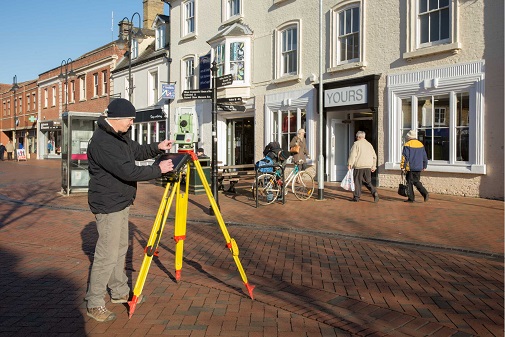Fully funded PhD available
Posted on Wednesday 12 May 2021

Start date: 1 October 2021
Application Deadline: 31 May 2021
Interviews will take place on week beginning 21 June 2021 via Zoom
The University of York and Historic England are pleased to announce the availability of a fully funded Collaborative doctoral studentship from October 2021 under the AHRC’s Collaborative Doctoral Partnership Scheme.
This project will explore one of the most pressing challenges facing the heritage sector: the consistent capture, selection and archiving of diverse digital data sets that ensure their future accessibility and interoperability by the public and historic environment stakeholders. This project will be jointly supervised by Dr Kate Giles and Kieron Niven (University of York) and David Andrews and Simon Taylor (HE) and the student will be expected to spend time at both the University of York and Historic England, as well as becoming part of the wider cohort of CDP funded students across the UK. The studentship can be studied either full or part-time.
Project Overview
The project will take as its focus the historic High Street, which is currently facing a period of unprecedented change as COVID accelerates long-term trends in retail and residential demand, and as developers and local authorities seek to support the sustainable development of this heritage asset to meet key challenges of economic and environmental sustainability, housing needs, and climate change. The project will use the multiple and diverse digital data sets by commercial archaeology, planning authorities, developers, architects and creatives as the evidence base for a ground-breaking doctoral study supported by supervisors and partners from Historic England, the University of York’s Archaeology Department especially its globally-leading centre of excellence, the Archaeology Data Service (ADS) and its strong links with the international cross-sector membership organisation, the Digital Preservation Coalition (DPC).
Close attention will be paid to the formats of digital data sets generated by stakeholders with particular emphasis on new developments in complex digital data sources such laser scanning and LIDAR and the capacity and potential of data management systems such as GIS and HBIM to support better sharing, accessibility and interoperability within and between relevant stakeholders, aligning with HE’s Heritage Information Access Strategy (HIAS).
Research questions include:
- What are the key issues relating to the generation, accessibility and archiving of digital data within commercial archaeology, planning and development and the wider historic built environment sector?
- How can the heritage sector learn from other sectors, share good practice and create new cross-cutting initiatives?
- What new technologies, policies, guidance, standards or initiatives are needed by the sector?
Details of Award
CDP doctoral training grants fund full-time studentships for 45 months (3.75 years) or part-time equivalent. The studentship has the possibility of being extended for an additional 3 months to provide professional development opportunities, or up to 3 months of funding may be used to pay for the costs the student might incur in taking up professional development opportunities.
The award pays tuition fees up to the value of the full-time home UKRI rate for PhD degrees. Research Councils UK Indicative Fee Level for 2021/22 is £4,500 and international students would therefore need to make up the difference between the home and international fee level. The award pays full maintenance for all students both home and international students. The National Minimum Doctoral Stipend for 2021/22 is £15,609, *plus a CDP maintenance payment of £550/year.
Further details can be found on the UKRI website.
The student is eligible to receive an additional travel and related expenses grant during the course of the project courtesy of Historic England worth up to £1000 per year for 3.75 years (45 months). The project can be undertaken on a full-time or part-time basis.
Eligibility
This studentship is open to both Home and International applicants. To be classed as a home student, candidates must meet the following criteria:
- be a UK National (meeting residency requirements), or
- have settled status, or
- have pre-settled status (meeting residency requirements), or
- have indefinite leave to remain or enter.
Further guidance can be found on the UKRI website.
We want to encourage the widest range of potential students to study for a CDP studentship and are committed to welcoming students from different backgrounds to apply. We particularly welcome applications from Black, Asian, Minority, Ethnic (BAME) backgrounds as they are currently underrepresented at this level in this area.
- Applicants should ideally have or expect to receive a relevant Masters-level qualification, or be able to demonstrate equivalent experience in a professional setting. Suitable disciplines are flexible, but might include Archaeology, Computer Science and Information Systems, Geospatial Survey, Architecture and Urban planning, wider historic built environment sector.
- Applicants must be able to demonstrate an interest in the heritage sector and potential and enthusiasm for developing skills more widely in related areas.
- As a collaborative award, students will be expected to spend time at both the University and Historic England.
NB. All applicants must meet UKRI terms and conditions for funding. See:
https://www.ukri.org/funding/information-for-award-holders/grant-terms-and-conditions/
Project details and how to apply
Find more information and how to apply on the FindAPhD website.
For any questions or queries related to this project, please contact the Lead Supervisor, Dr Kate Giles (kate.giles@york.ac.uk)
The successful candidate will be eligible to participate in CDP Cohort Development events.
